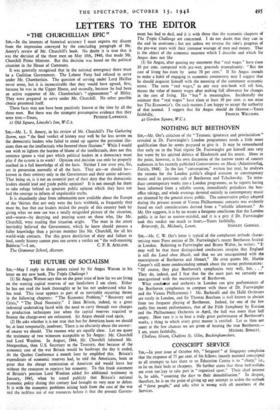Sm,—Mr. L. S. Amery, in his review of Mr. Churchill's
The Gathering Storm, says " the final verdict of history may well be far less severe on the democratic leaders who failed to stand up against the prevalent illu- sions than on the intellectuals who fostered those illusions." While I would not wish to lighten the burden of blame of the intellectuals, does not this sentence ignore a vital part which political leaders in a democracy must play if the system is to work? Opinion and decision can only be properly reached in a full knowledge of all the facts. Neither I nor even you, Sir, are in possession normally of all the facts. They are—or should be— known in their entirety only to the Government and their senior advisers. That being so, is it not an essential part of their duty that the democratic leaders should lead and guide public opinion? It is not enough for them to take refuge behind an ignorant public opinion which they have not had the courage to inform of unpalatable truths.
It is abundantly clear from information now available about the Europe of the 'thirties that not only were the facts withheld, as frequently they must be, but that our leaders misled the people of this country both by giving what we now see was a totally misguided picture of the situation, and—worse—by decrying and pouring scorn on those who, like Mr. Churchill, were reading that situation aright. The man in the street inevitably believed the Government, which he knew should possess a fuller knowledge than a private member like Mr. Churchill, for -all his world-wide contacts. For this grave dereliction of duty and failure to lead, surely history cannot pass too severe a verdict on " the well-meaning


































 Previous page
Previous page